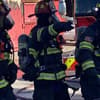Podcast
Questions and Answers
What type of procedures does the document provide for Coral Springs-Parkland Fire Department units?
What type of procedures does the document provide for Coral Springs-Parkland Fire Department units?
- On-scene communication procedures (correct)
- Medical response procedures
- Incident investigation procedures
- Search and rescue procedures
What should the first arriving unit communicate to Dispatch?
What should the first arriving unit communicate to Dispatch?
- Unit establishing incident command (IC), location of staging area, and request for additional resources
- Initial scene size-up, location of primary staging area, and request for next level alarms
- Unit on-scene, initial scene size-up, and unit establishing incident command (IC) (correct)
- Unit on-scene, declaration of a working incident, and request for a tactical channel
When should the request for additional resources and next level alarms be made?
When should the request for additional resources and next level alarms be made?
- 20 minutes after establishing incident command
- Immediately upon arrival at the scene
- When a 360 assessment has been conducted (correct)
- Only after receiving instructions from Dispatch
What should be included in the communications to Dispatch from the first arriving unit?
What should be included in the communications to Dispatch from the first arriving unit?
In radio communications on the fire ground, why should personnel avoid using codes?
In radio communications on the fire ground, why should personnel avoid using codes?
Why is it important for personnel to remain aware of radio traffic and wait for breaks before transmitting?
Why is it important for personnel to remain aware of radio traffic and wait for breaks before transmitting?
What should personnel do before pressing the transmit button during radio communications?
What should personnel do before pressing the transmit button during radio communications?
What should be the nature of radio transmissions on the fire ground, according to the text?
What should be the nature of radio transmissions on the fire ground, according to the text?
Why should personnel acknowledge receipt of transmissions/orders and repeat them?
Why should personnel acknowledge receipt of transmissions/orders and repeat them?
Why should portable radios not be operated in an explosive atmosphere unless they are rated as intrinsically safe?
Why should portable radios not be operated in an explosive atmosphere unless they are rated as intrinsically safe?
Flashcards are hidden until you start studying
Study Notes
Coral Springs-Parkland Fire Department Procedures
- The document provides procedures for Coral Springs-Parkland Fire Department units responding to emergencies.
First Arriving Unit Communications
- The first arriving unit should communicate the following to Dispatch:
- Situation assessment
- Resource needs
- Request for additional resources
- Next level alarms
Requesting Additional Resources
- Requests for additional resources and next level alarms should be made:
- When the situation dictates
- Based on the first arriving unit's situation assessment
Radio Communications on the Fire Ground
- Personnel should avoid using codes in radio communications because:
- They can be misunderstood
- They can cause delays
- Personnel should:
- Remain aware of radio traffic
- Wait for breaks before transmitting to:
- Avoid interference
- Ensure clear communication
- Before pressing the transmit button, personnel should:
- Ensure they have a clear message
- Ensure they are using the correct radio channel
- Radio transmissions on the fire ground should be:
- Clear
- Concise
- Direct
- Personnel should acknowledge receipt of transmissions/orders and repeat them to:
- Ensure understanding
- Prevent miscommunication
Portable Radio Safety
- Portable radios should not be operated in an explosive atmosphere unless they are rated as intrinsically safe to:
- Prevent ignition of flammable gases
- Ensure personnel safety
Studying That Suits You
Use AI to generate personalized quizzes and flashcards to suit your learning preferences.





